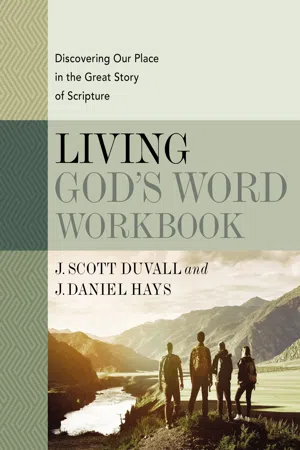
Living God's Word Workbook
Discovering Our Place in the Great Story of Scripture
- 160 pages
- English
- ePUB (mobile friendly)
- Available on iOS & Android
Living God's Word Workbook
Discovering Our Place in the Great Story of Scripture
About This Book
A Companion WORKBOOK to Help You Discover the Great Story of Scripture and Find Your Place in It
Living God's Word is your pathway to read the Bible as it was meant to be read: as God's Great Story. This WORKBOOK is designed for use alongside the second edition of Living God's Word. While the textbook helps you see the big picture of what God is doing throughout the Bible, the WORKBOOK lets you reflect on and internalize what you are reading.
Many Christians resolve to study the Bible more fervently, but often struggle to grasp the progression of Scripture as a whole. They encounter various passages each week through unrelated readings, studies, and sermons and it all feels disconnected. But once they see the Bible as God's Great Story, they begin to understand how it all fits together and they start see how their own lives fit into what God has done and is doing in the world.
In Living God's Word, Second Edition, New Testament scholar J. Scott Duvall and Old Testament expert J. Daniel Hays help Christians consider how their lives can be integrated into the story of the Bible, thus enabling them to live faithfully in deep and important ways. Living God's Word explores the entire Bible through broad themes that trace the progression of God's redemptive plan. Each section deals with a certain portion of Scripture's story and includes:
- Reading/listening preparation
- Explanation
- Summary
- Observations about theological significance
- Connections to the Great Story
- Written assignments for further study
These features--combined with the authors' engaging style--make Living God's Word an ideal book for those who want to understand the Bible better, for introductory college courses, Sunday school electives, or small group study.
When used alongside the textbook, this workbook is the ideal resource for anyone looking to better understand how the entire Bible fits together as God's Great Story.
Frequently asked questions
Information
CHAPTER 1
CREATION AND CRISIS:
Who Am I and What Is Wrong?
WRITING ASSIGNMENTS
CHAPTER 1 FOCUSED READING: GENESIS 1–2
CHAPTER 2
COVENANT:
God Makes a Promise and Establishes a People
WRITING ASSIGNMENTS
CHAPTER 2 FOCUSED READING: GENESIS 12:1–7
CHAPTER 3
CALLING OUT:
“I am the LORD who brought you up out of Egypt”
WRITING ASSIGNMENTS
CHAPTER 3 FOCUSED READING: EXODUS 2:24–3:22
Table of contents
- Cover Page
- Title Page
- Copyright Page
- Ebook Instructions
- Contents
- Introduction
- 1. Creation and Crisis: Who Am I and What Is Wrong?
- 2. Covenant: God Makes a Promise and Establishes a People
- 3. Calling Out: “I am the Lord who brought you up out of Egypt”
- 4. Commandments: Terms for Living In the Promised Land With God In Their Midst
- 5. Conquest and Canaanization: Good News and Bad News
- 6. Creation of the Kingdom: Nobodies and Somebodies
- 7. Communion and Common Sense In the Kingdom: Worship and Other Ways to Live Wisely
- 8. Crumbling of the Kingdom: The Prophets and the End of Israel and Judah
- 9. Captivity and Coming Home: Surviving the Exile and Returning to the Land
- 10. Interlude: Time Between the Testaments
- 11. Christ: Jesus Enters Our World
- 12. Christ: Jesus’s Message
- 13. Christ: Jesus’s Journey to Jerusalem
- 14. Christ: Jesus Dies On the Cross
- 15. Christ: Jesus Is Raised from the Dead
- 16. Church: The Coming of the Spirit
- 17. Church: In Jerusalem, Judea, and Samaria
- 18. Church: The Mission to the Gentiles
- 19. Church: The Gospel Spreads from Jerusalem to Rome
- 20. Consummation: The Happy Ending to the Great Story
- Conclusion